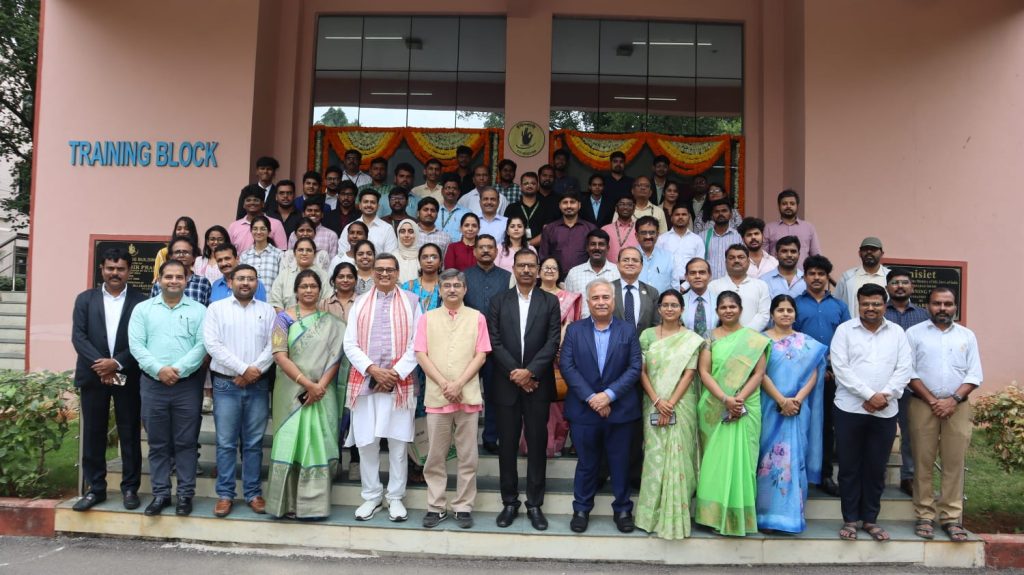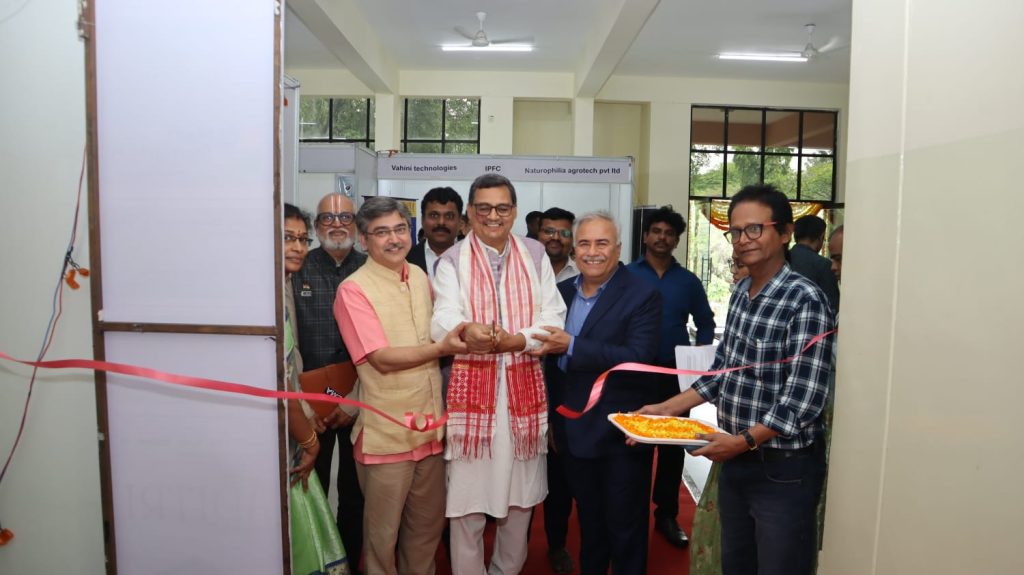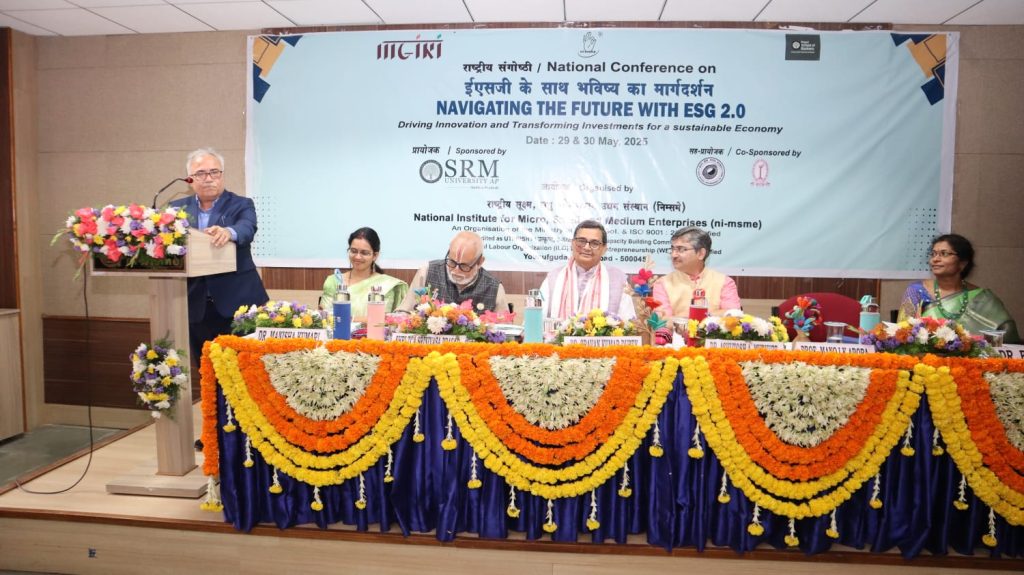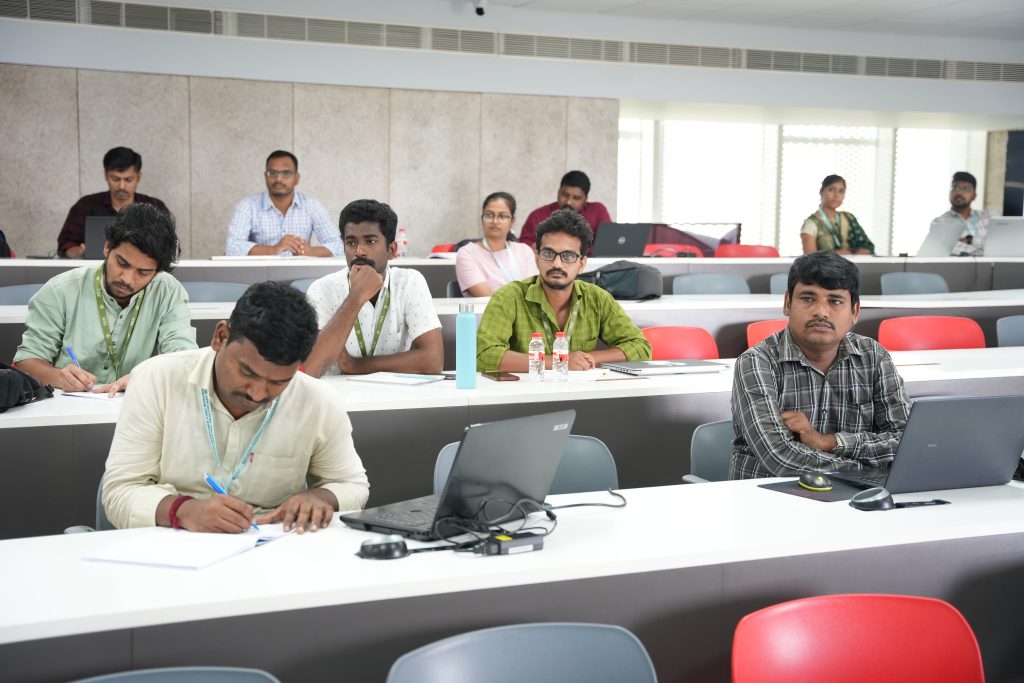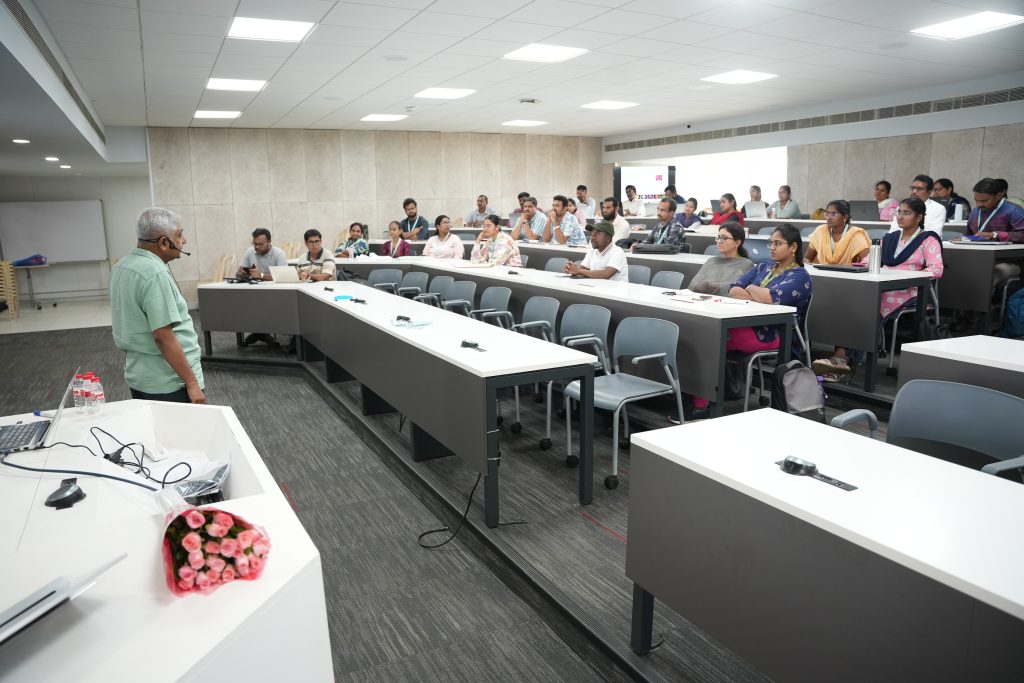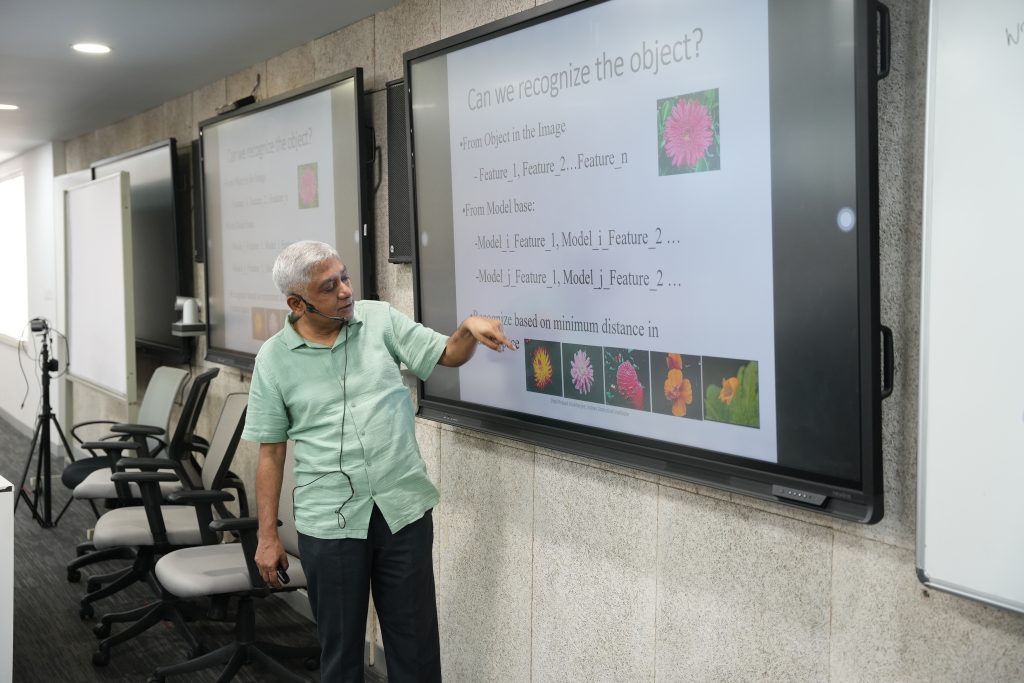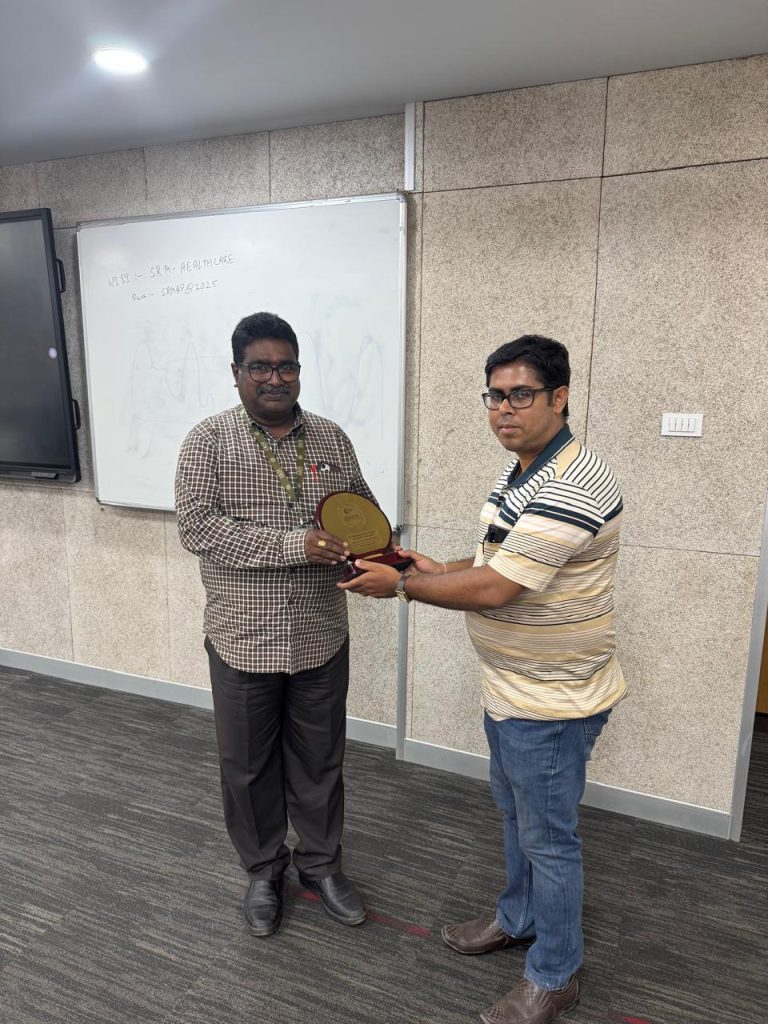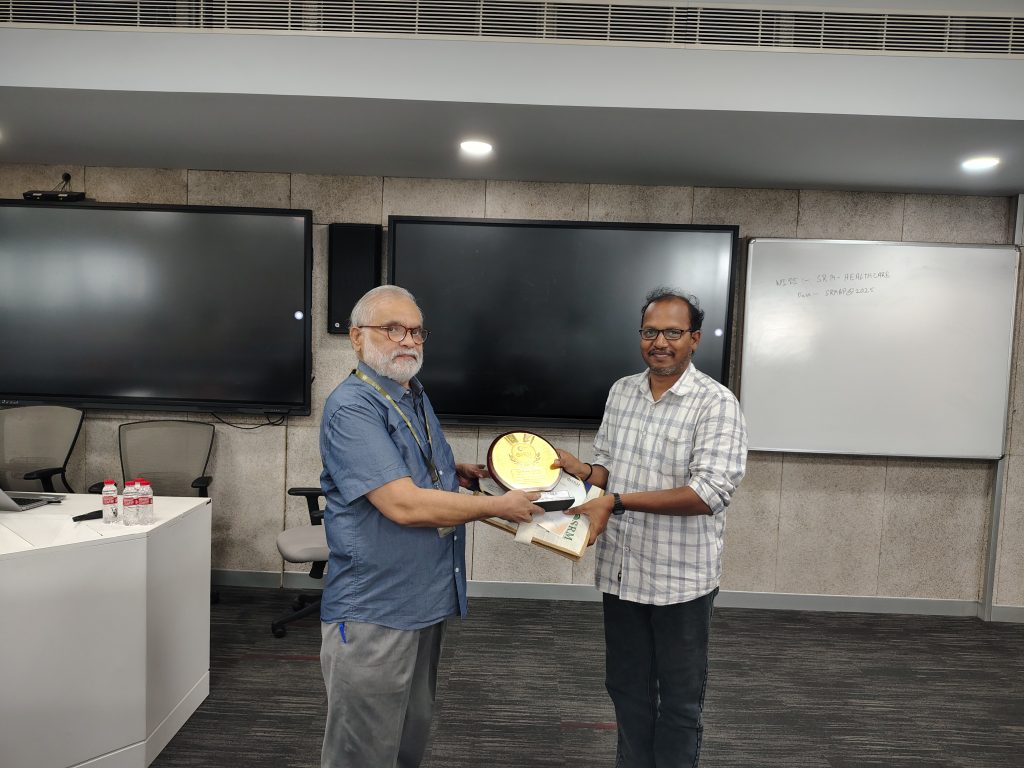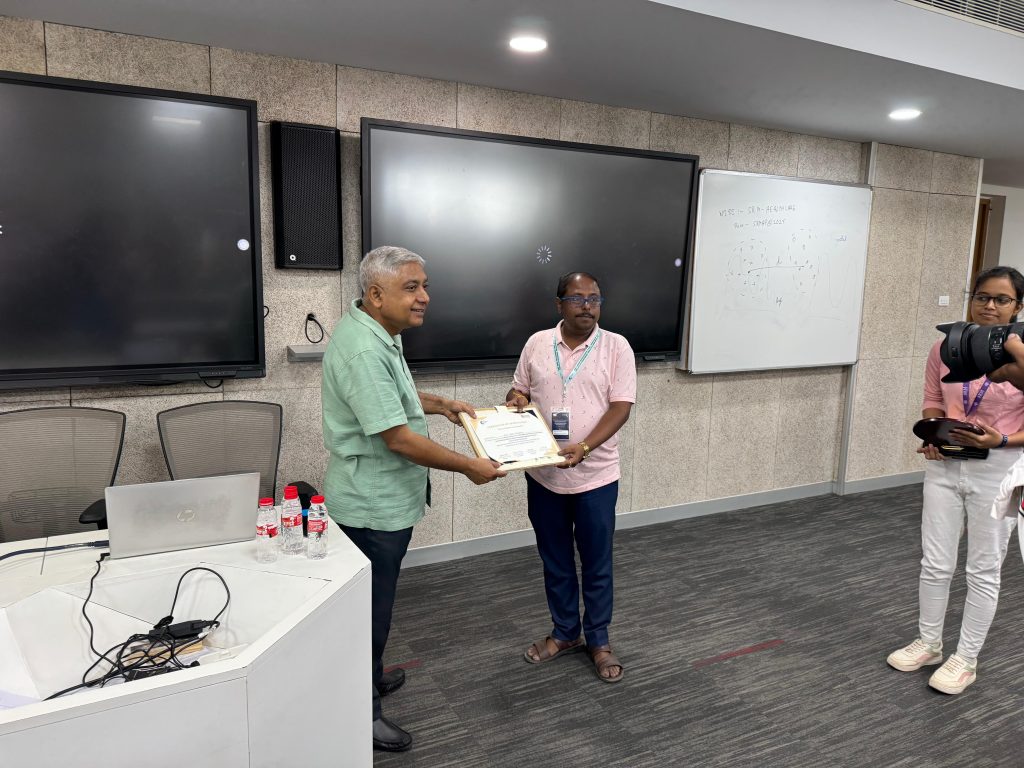SRM-AP All News
ALL News
- Folded Aromatic Polyamides Enabling Faster Charge Transport June 2, 2025
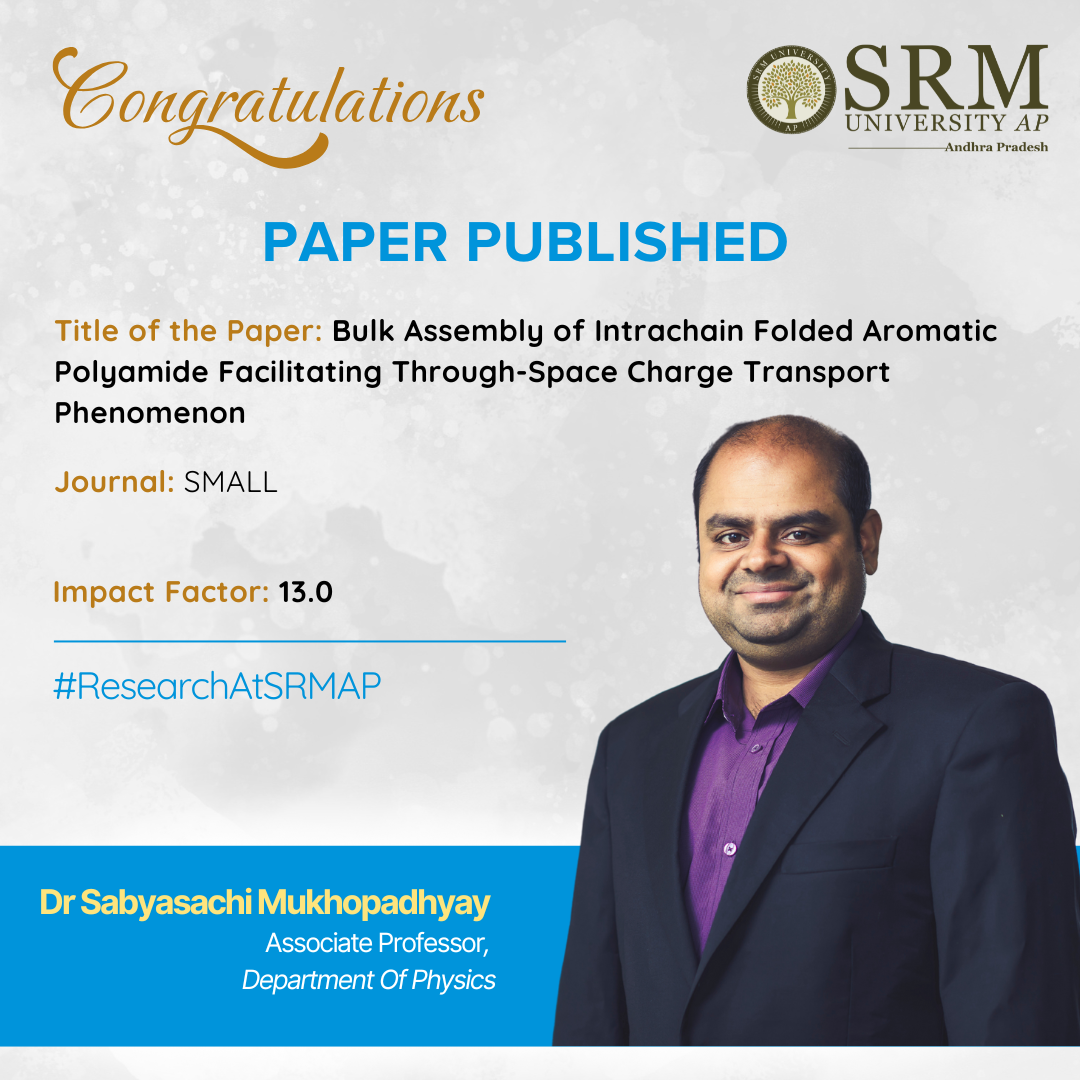 In the quest for next-generation organic electronic materials, researchers have drawn inspiration from nature’s intricate designs. A groundbreaking study titled “Bulk Assembly of Intrachain Folded Aromatic Polyamides Facilitating Through-Space Charge Transport Phenomenon” led by Dr Sabyasachi Mukhopadhyay, Associate Professor in the Department of Physics, introduces a novel class of polymers that mimic the secondary structures of biomolecules. Published in the high-impact Q1 journal SMALL with an Impact Factor of 13.0, this research unveils the potential of intrachain folded aromatic polyamides in facilitating efficient through-space charge transport.
In the quest for next-generation organic electronic materials, researchers have drawn inspiration from nature’s intricate designs. A groundbreaking study titled “Bulk Assembly of Intrachain Folded Aromatic Polyamides Facilitating Through-Space Charge Transport Phenomenon” led by Dr Sabyasachi Mukhopadhyay, Associate Professor in the Department of Physics, introduces a novel class of polymers that mimic the secondary structures of biomolecules. Published in the high-impact Q1 journal SMALL with an Impact Factor of 13.0, this research unveils the potential of intrachain folded aromatic polyamides in facilitating efficient through-space charge transport.Abstract :
This study presents the design and synthesis of periodically grafted aromatic Polyamides capable of intrachain folding, mimicking secondary structures seen in biomolecules. Leveraging the immiscibility between aromatic backbones and Polyethylene glycol (PEG) side chains, the polymers self-assemble into lamellar, phase-separated domains with ordered π-stacking.The structural order is further enhanced by incorporating aromatic guest molecules, enabling efficient through-space charge transport. Structural and morphological investigations via SAXS, WAXS, AFM, and TEM confirm the formation of highly ordered π-domains. Charge transport measurements reveal vertical current densities as high as 10⁻⁴ A/cm² in annealed host–guest complexes, comparable to conventional conjugated polymers, demonstrating the potential of these materials for stable, anisotropic organic electronics.
Practical implementation :
This research provides a new strategy for designing flexible, stable, and efficient organic electronic materials without the need for traditional conjugated polymers. The ability to precisely control the orientation and spacing of conductive regions at
The nanoscale opens doors for:
- Wearable and stretchable electronics
- Flexible sensors and low-power devices
- Organic transistors and memory devices with tunable directionality
- Environmentally stable devices, useful in humid or high-temperature conditions
- These innovations can lower manufacturing costs, enhance sustainability, and enable novel applications in healthcare, IoT, and smart textiles.
This research was a collaborative effort between multiple departments and institutions including Department of Chemical Sciences, IISER Mohali, Department of Physical Sciences, IISER Mohali and Department of Physics, SRM University – AP (Ramkumar K, Dr Sabyasachi Mukhopadhyay) and was supported by Department of Science and Technology – Science and Engineering Research Board (DST-SERB)
Future research plans:
Dr Sabyasachi Mukhopadhyay is working towards “Integrated Center for Organic Electronics” – a multidisciplinary innovation hub focused on designing the next generation of flexible, sustainable, and high-performance electronic materials and devices.
Continue reading → - Review of The Bloomsbury Handbook to the Digital Humanities (DH) June 2, 2025
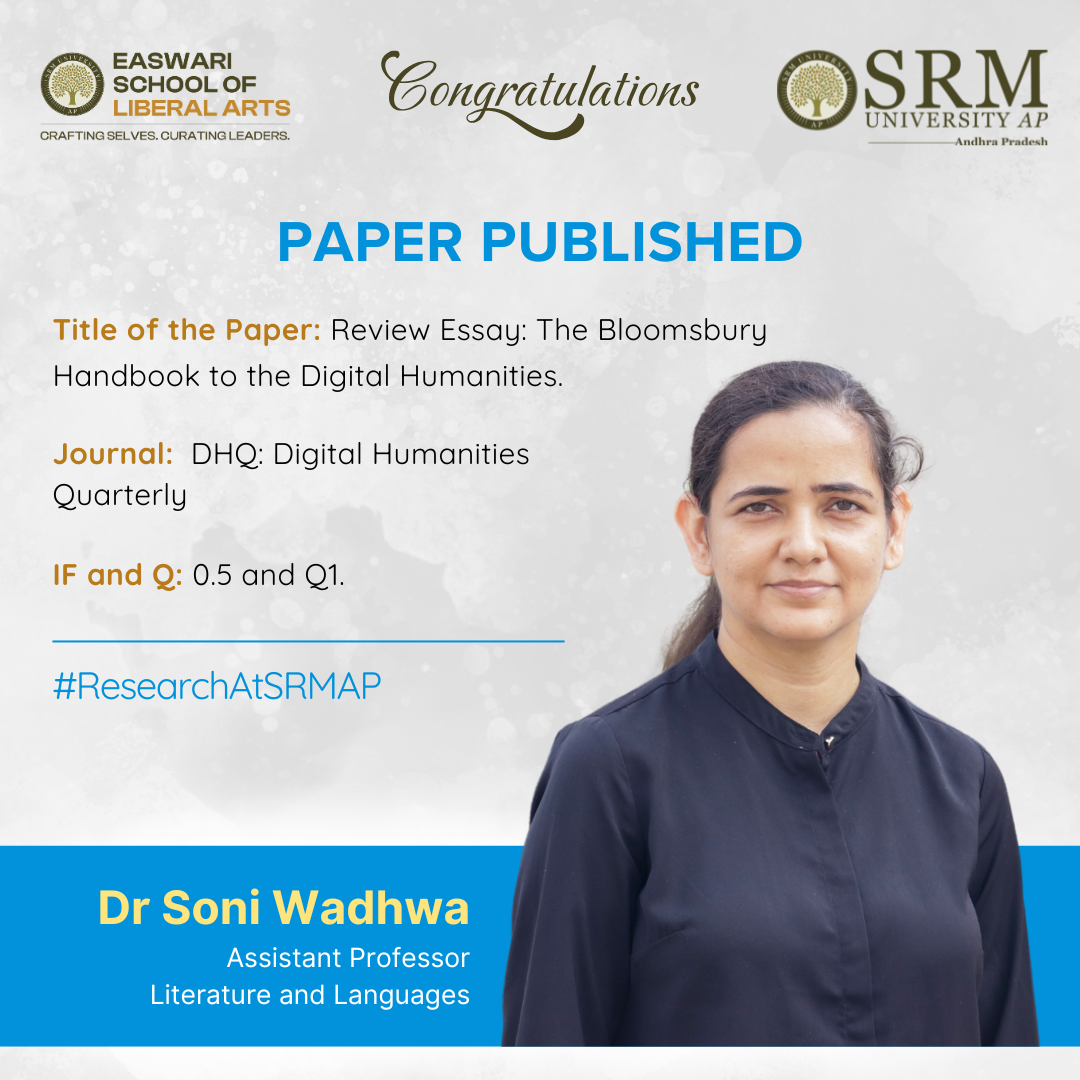 A handbook is a complex and demanding genre, it must offer a comprehensive overview of a field, articulating its foundational principles, charting ongoing debates, and identifying potential future directions. Such volumes are often judged as much by what they exclude as by what they include. Within this context Dr Soni Wadhwa, Assistant Professor in the Department of Literature and Languages, approached “The Bloomsbury Handbook to the Digital Humanities” in her review essay published in the Q1 journal “DHQ: Digital Humanities Quarterly”.
A handbook is a complex and demanding genre, it must offer a comprehensive overview of a field, articulating its foundational principles, charting ongoing debates, and identifying potential future directions. Such volumes are often judged as much by what they exclude as by what they include. Within this context Dr Soni Wadhwa, Assistant Professor in the Department of Literature and Languages, approached “The Bloomsbury Handbook to the Digital Humanities” in her review essay published in the Q1 journal “DHQ: Digital Humanities Quarterly”.Abstract
The Bloomsbury Handbook, edited by James O’Sullivan is framed as a forward-looking resource aimed at fostering further developments in the field of digital humanities (DH). In his introduction, O’Sullivan notes that the volume is designed to serve three categories of readers: DH experts, the DH-curious, and skeptics. The collection is divided into five thematic sections: “Perspectives & Polemics,” “Methods, Tools, & Techniques,” “Public Digital Humanities,” “Institutional Contexts,” and “DH Futures.” Each section features chapters that provide overviews of key subfields while engaging with specific methodological and theoretical issues.
In her review, Dr Wadhwa refrains from summarising all 43 chapters. Instead, she evaluates what the handbook offers to the different categories of readers it aims to serve. She highlights the volume’s self-critical tone and its ability to generate meaningful dialogue about the contributions and challenges of digital humanities in analysing culture and text.
Dr Wadhwa also addresses the misconceptions and hesitations that often surround digital humanities, particularly among scholars from humanities and social sciences who may feel excluded due to a lack of technical expertise. Her review seeks to demystify the field by showcasing exemplary work from leading scholars, thereby offering guidance to researchers interested in exploring DH.
Practical Implementations and Future Research plans:
She hopes that her essay will encourage aspiring researchers to delve deeper into the various subdomains of digital humanities and engage with the field with greater confidence. Dr Wadhwa emphasises the need for more accessible resources and institutional support for digital humanities, asserting its growing relevance within academia.
Looking ahead, she intends to build further on her work in the area of digital archiving which is a vital subdomain within digital humanities. She plans to write more extensively about the projects she has undertaken, contributing to the evolving discourse and practice of the field.
Continue reading → - Prof. Manoj K Arora Delivers a Session at the National Conference on ESG 2.0 June 2, 2025
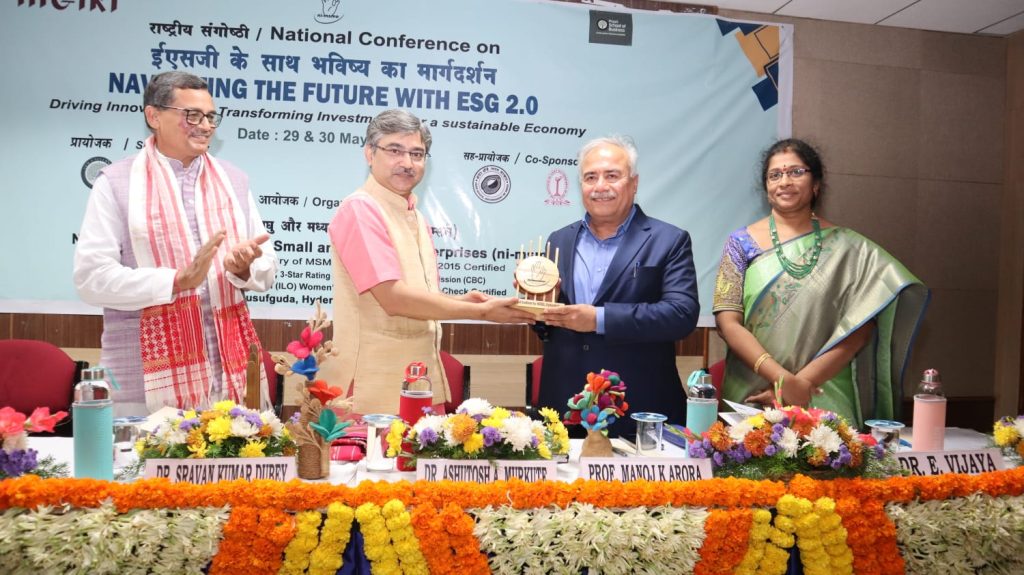
Prof. Manoj K Arora, Vice Chancellor, SRM University-AP, delivered an insightful session at the National Conference on Navigating the Future: ESG 2.0 held on the theme “Advancing Green Finance: Driving Innovations and Transforming Inventions for a Sustainable Economy”. Prof. Arora shared his insights on how ESG principles are seamlessly embedded into the educational landscape. The conference was jointly organised by the National Institute for Micro, Small and Medium Enterprises (ni-msme), FinRise, and Paari School of Business, SRM University-AP.
In his session, Prof. Arora addressed the vital role of Environmental, Social, and Governance (ESG) principles in shaping future-ready educational institutions. He elaborated on how SRM AP is embedding ESG into the five foundational pillars of higher education:
- Transparent and ethical Governance
- Eco-conscious Infrastructure
- Empowered Students, Faculty & Staff
- Value-driven Curricula
- Impactful Research & Innovation
He elaborated on SRM AP’s initiatives, including a Green Campus, SDG-aligned research clusters, a Centre of Excellence in Interdisciplinary Research, and the upcoming Master’s in Environmental and Sustainability Engineering, which is aligned with India’s sustainability goals. This highlighted that SRM AP successfully pursues and achieves sustainable transformation.
At SRM University-AP, Amaravati, education plays a transformative role in fostering environmental stewardship, social responsibility, and ethical leadership. The university strives to build a sustainable tomorrow.
Continue reading → - Kunja Rajitha, SRM-AP’s Trailblazer, Clinches Gold at the 26th Asian Athletics Championship June 2, 2025
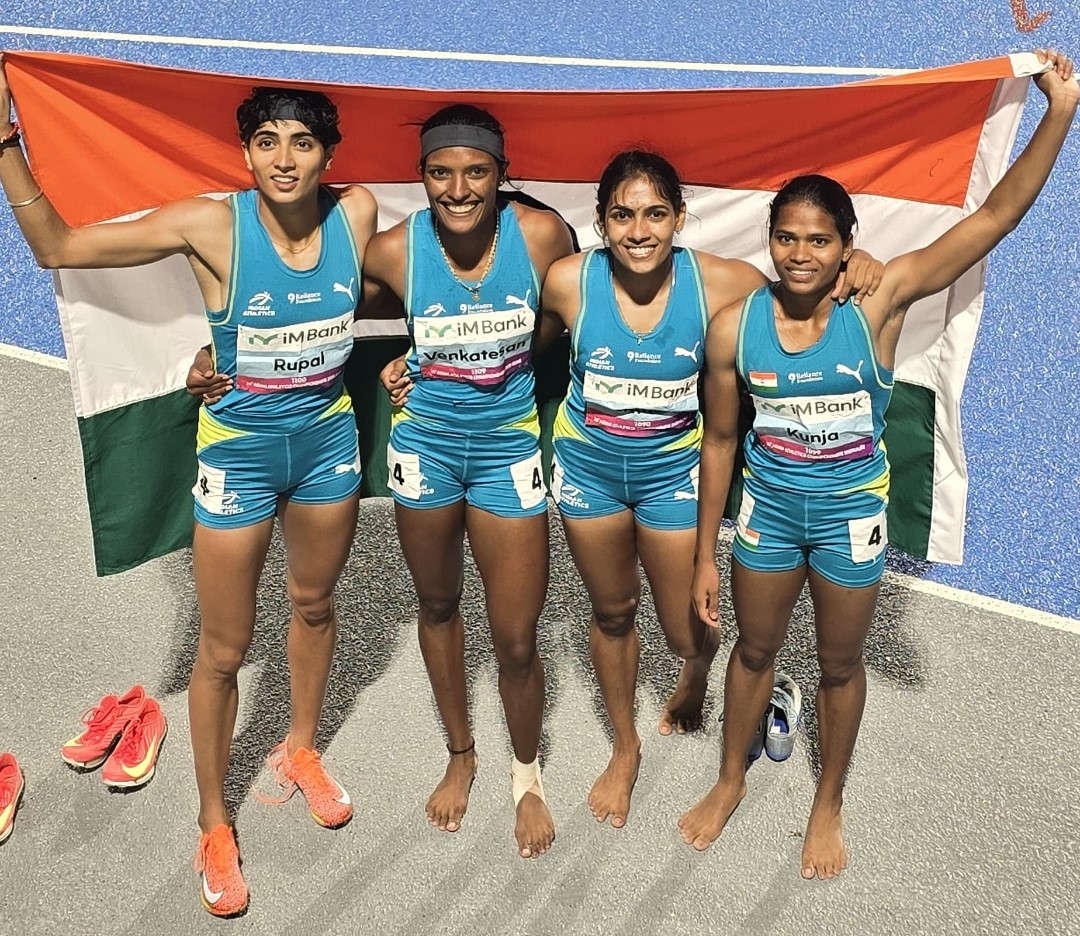 Ms Kunja Rajitha, a first-year B.Com. student at Paari School of Business, SRM University-AP, Amaravati, brought immense pride to the nation and the institution by clinching a Gold Medal in the Women’s 4×400m Relay at the 26th Asian Athletics Championship held at Gumi, South Korea, on Thursday.
Ms Kunja Rajitha, a first-year B.Com. student at Paari School of Business, SRM University-AP, Amaravati, brought immense pride to the nation and the institution by clinching a Gold Medal in the Women’s 4×400m Relay at the 26th Asian Athletics Championship held at Gumi, South Korea, on Thursday.Rajitha was part of the formidable relay team, which included Jisna Mathew, Rupal Chaudhary, and Subha Venkatesan. The team delivered a season-best time of 3:34.18s, edging past Vietnam and Srilanka in the finals. This victory marks a historic comeback for India, earning the first gold in this event since 2013, ending a 12-year wait.
Mr Anup Singh Suryavanshi, Director – Sports, SRM University-AP, congratulated her, saying, “Rajitha’s achievement is a testament to her hard work and resilience. Her performance on such a prestigious international platform inspires all student-athletes nationwide. Competing and winning at the Asian level reflects the caliber of talent we are proud to nurture at SRM University-AP.”
Prof Satish Kumar, Pro-Vice Chancellor of SRM University-AP, said, “ Rajitha’s journey reminds us that students can rise to any challenge with the right support and determination. Her dedication, perseverance, and success embody the spirit of excellence we strive to cultivate in the students here at our varsity. Her success adds to the growing legacy of SRM University-AP as a hub for emerging talent and global achievers.”
Prof Manoj K Arora, Vice Chancellor of SRM University-AP, also lauded her win, saying, ” This victory is not just a personal milestone in Rajitha’s career but also a significant achievement celebrated by all of us here who have followed and supported her progress. Her gold medal win reinforces our vision of holistic student development. We take extreme pride in her success and look forward to many more such triumphs.”
Kunja Rajitha hails from a humble and inaccessible tribal village near Kunavaram in the Alluri district of Andhra Pradesh state. Despite all odds, she continued her education while pursuing her dream and became a national-level athlete. Rajitha bagged gold in the 400-metre sprint event at the Khelo India Youth Games-2022, held in Haryana. She also secured second place in a similar event in the 2019 edition of Khelo India held in Assam. In 2018, Rajitha joined Tenvic Sports Academy in Nellore. Later, she trained under coach Mike Russell at SAA Centre of Excellence in Guntur.
Rajitha’s remarkable achievement reflects SRM University-AP’s unwavering commitment to fostering the overall development, where students are encouraged to pursue excellence in sports alongside academics on both national and international platforms.
Continue reading → - BSc Chemistry Student Secures Prestigious IASc-INSA-NASI Summer Research Fellowship 2025 May 30, 2025
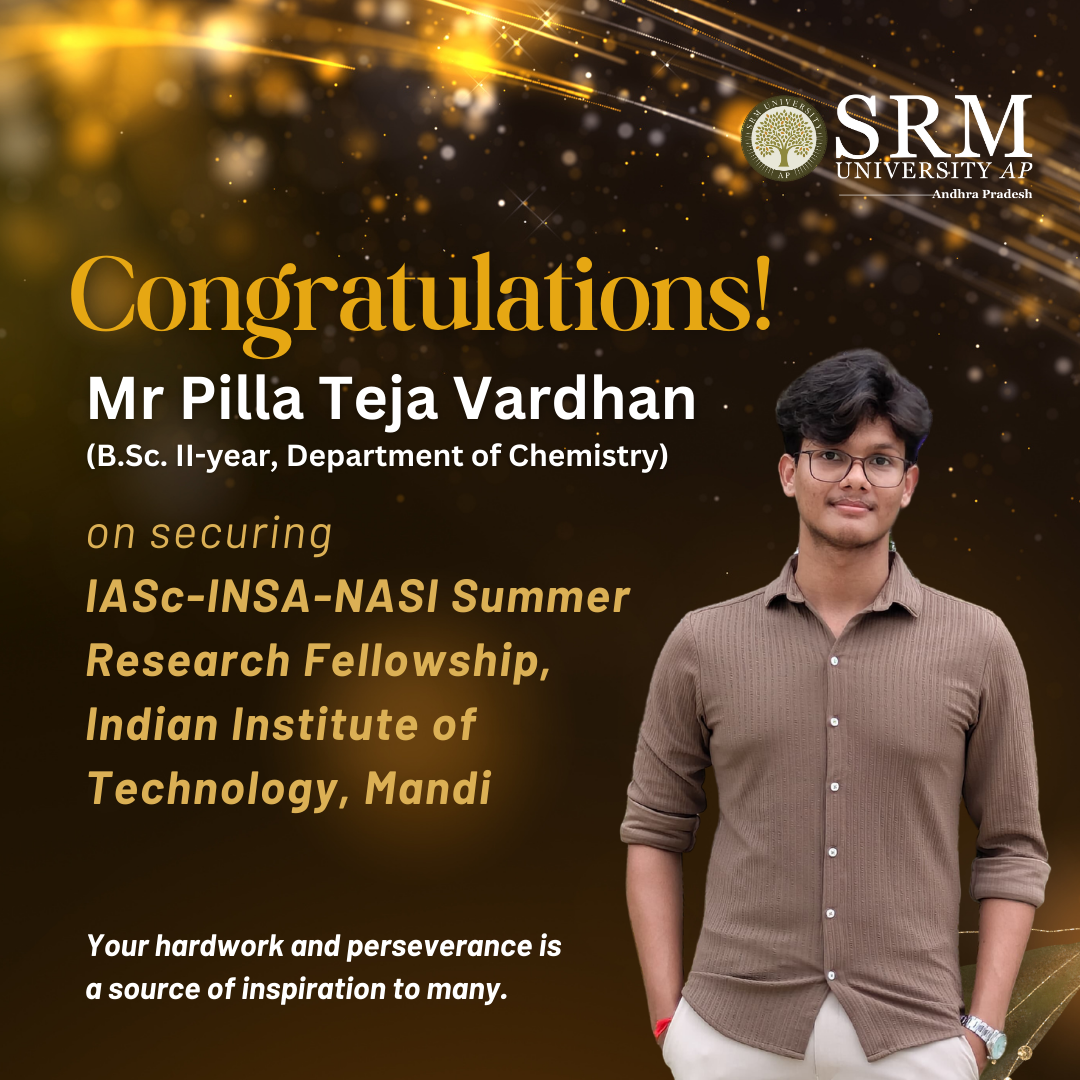 Mr Pilla Teja Vardhan, a second-year B.Sc. Chemistry student, has been selected for the highly prestigious IASc-INSA-NASI Summer Research Fellowship 2025. This esteemed fellowship is jointly offered by the Indian Academy of Sciences (IASc), Indian National Science Academy (INSA), and The National Academy of Sciences, India (NASI) India’s premier scientific institutions committed to nurturing research talent across the country.
Mr Pilla Teja Vardhan, a second-year B.Sc. Chemistry student, has been selected for the highly prestigious IASc-INSA-NASI Summer Research Fellowship 2025. This esteemed fellowship is jointly offered by the Indian Academy of Sciences (IASc), Indian National Science Academy (INSA), and The National Academy of Sciences, India (NASI) India’s premier scientific institutions committed to nurturing research talent across the country.As part of this elite program, Teja Vardhan will spend eight weeks at the Indian Institute of Technology (IIT), Mandi, under the expert mentorship of Dr Amit Jaiswal, engaging in cutting-edge research in the field of Nanomatter and advanced material chemistry. This opportunity will enable him to gain valuable hands-on research experience, deepen his scientific insight, and contribute to ongoing investigations in frontier areas of science.
The IASc-INSA-NASI Summer Research Fellowship is known for its rigorous selection process and generous support. Selected students receive a monthly stipend of ₹12,500. The fellowship ensures a fully supported and immersive research experience at some of India’s leading scientific institutions.
About the Fellowship
Continue reading →
The IASc-INSA-NASI Summer Research Fellowship Program is one of India’s most competitive undergraduate research initiatives, designed to provide meritorious students with exposure to advanced scientific research. Fellows work closely with leading researchers across academic and national laboratories, fostering a strong foundation for future scientific careers. - CSE Workshop on Revolutionising Health Care with AI May 30, 2025
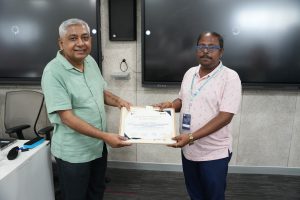 In an era when Artificial Intelligence is growing in popularity, the Department of Computer Science and Engineering decided to leverage its possibilities and expand the scope of its application across the Healthcare sector. The five-day workshop titled Revolutionising Health Care with AI: Computer Biology and Computer, sponsored by DST-ANRF, was one such event.
In an era when Artificial Intelligence is growing in popularity, the Department of Computer Science and Engineering decided to leverage its possibilities and expand the scope of its application across the Healthcare sector. The five-day workshop titled Revolutionising Health Care with AI: Computer Biology and Computer, sponsored by DST-ANRF, was one such event.The five-day workshop explored the revolutionary potential of AI Technologies in medical diagnostics with special emphasis on the areas of Computational biology. The workshop also focused on areas of Computational Biology and Computer Vision to improve healthcare by enhancing clinical decision making and enabling personalised healthcare treatments and diagnosis.
The workshop saw the participation of academicians, research scientists and industrial experts from the fields of computer sciences, biology and data science. The workshop aimed to facilitate discussions on effectively combining computational techniques with biological research.
The workshop, apart from facilitating cross-disciplinary discussion and knowledge sharing, also laid emphasis on revisiting foundational concepts nd advancements in the areas of computer vision and machine learning. They further explored the practical implications of these concepts. The workshop also offered hands-on training opportunities to give the attendees a clear understanding of the concept and delving into areas like AI and Multiomics Data.
The participants also had the opportunity to engage in brainstorming discussions, explore innovative methods that significantly contribute to healthcare improvement, and use algorithms to enable early detection of disease. Among the notable speakers who spoke at the workshop were Prof. (Dr) Lars Kaderali from the university of University of Cologne; Dr Suvendu Rup from NIT Raipur, Prof. (Dr) Amlan Chakrabarti from the A K Choudhury School of Information Technology at the University of Calcutta and an Adjunct Professor at IIIT Delhi and Prof. (Dr) Ram Bilas Pachori among others. Their insights and expertise offered participants a thought-provoking five-day workshop that would meaningfully benefit the field of Healthcare, paving the way for innovative tools and methods that will enhance patient care.
Continue reading → - Synthesising Copper-based Particles to Recycle Industrial Mineral Waste into Useful Products May 29, 2025
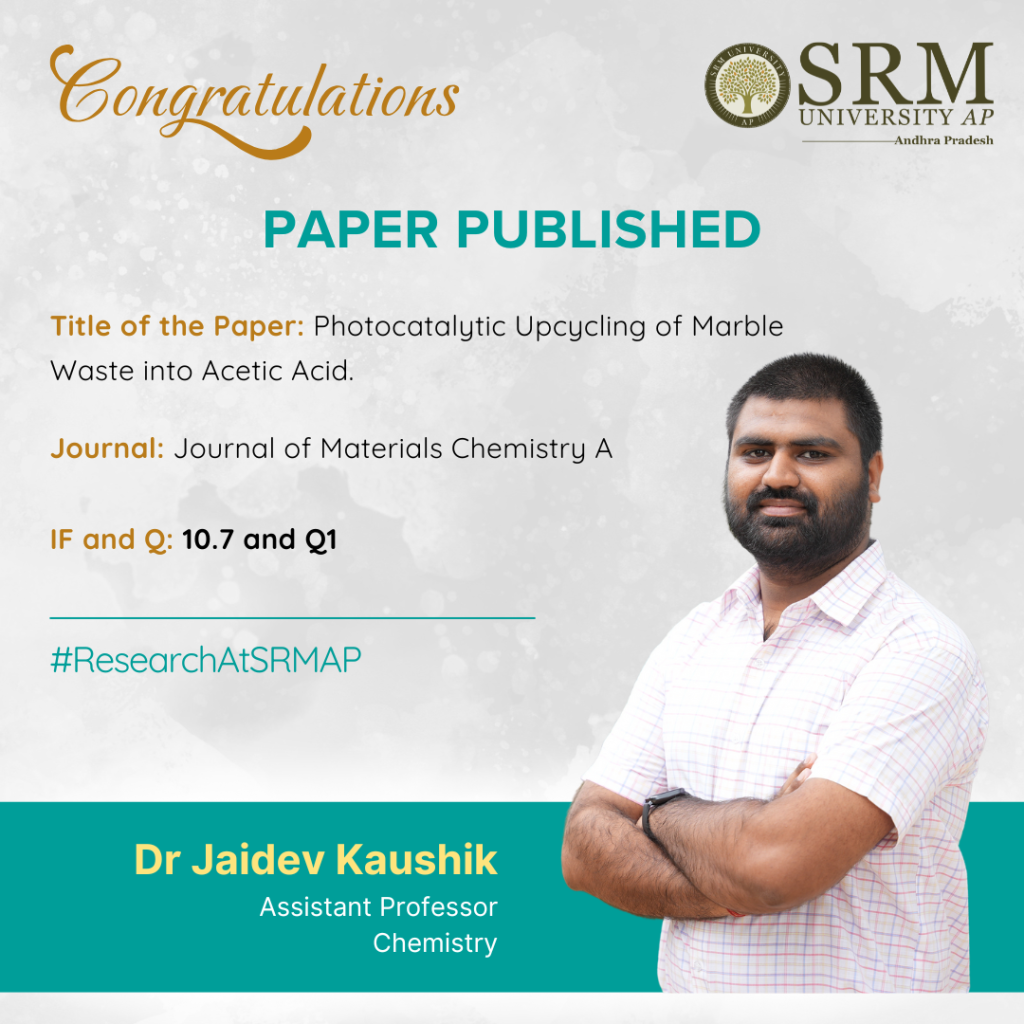
In an attempt to recycle industrial mineral waste into useful products, Dr Jaidev Kaushik from the Department of Chemistry has worked on synthesising copper-based particles that use light to convert carbonate-rich materials like marble dust into acetic acid, a valuable chemical used in industry and fuel production. He has published his research in a paper titled “Photocatalytic Upcycling of Marble Waste into Acetic Acid” in the prestigious Journal of Materials Chemistry A, having an impact factor of 10.7.
The particles drive the reaction efficiently by illuminating the green light on a mixture of the material and hydrogen peroxide solution. He has also tested the method on other carbonate wastes like chalk dust and scale, showing its potential for recycling industrial mineral waste into useful products.
Abstract
In this study, disk-shaped copper sulfide nanoparticles (CuS-NPs) were synthesised via a simple co-precipitation method and used as a photocatalyst for the reduction of carbonate species derived from marble dust into acetic acid (AcOH), an important industrial and biofuel precursor. The photocatalytic reaction was carried out under monochromatic light (525 nm) in a hydrogen peroxide–water mixture, which served as an electron and radical-rich medium. Key parameters such as solvent composition, light source, catalyst concentration and reaction time were optimised to get the maximum yield of AcOH. The reaction mechanism was investigated using radical scavenging experiments. The practical applicability of the approach was further tested on two additional real-life carbonate waste materials, i.e. chalk dust and scale.
Practical Implementation/ Social Implications of the Research
This research offers a sustainable method to convert carbonate-rich industrial wastes like marble dust, chalk dust, and scale into acetic acid, which is widely used in the chemical, pharmaceutical, and biofuel industries. By using light-driven reactions with safe, low-cost materials, the process reduces environmental pollution, supports waste valorisation, and contributes to a circular economy. It can be implemented in industries that generate carbonate waste, promoting green chemistry and lowering dependence on fossil-based raw materials.
Collaborations
Dr Sumit Kumar Sonkar (MNIT Jaipur, India)
Future Research Plans
- The adsorption/photodegradation-assisted quick and efficient removal of next-generation advanced pollutants such as microplastic, pesticides, pharmaceutical waste, etc., by hydrophobic carbon aerogel and their doped and functionalised versions.
- Utilising waste-derived heterogeneous catalysts in organic transformation reactions.
- Selective sensing of toxic metal ions/biomarkers/biomolecules using fluorescent nanomaterials.
- Upcycling of carbonates/CO2 via photo/thermal assisted catalysed reactions to get C1 and C2 hydrocarbons (green fuel).
- Reduction of nitrates/N2 via photo/thermal-assisted catalysed reactions to ammonia.
Link to the article
Continue reading →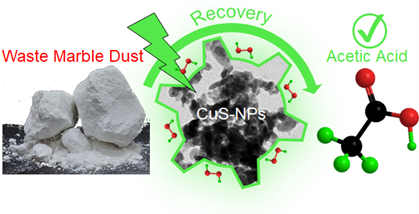
- From Vision to Victory — SRM AP Tops the Times Ranking 2025! May 29, 2025
SRM University-AP continues its legacy of excellence as it emerges as the No.1 Emerging Engineering Institute under 3 categories in the Times Engineering Institutes Ranking Survey consecutively for the second year. The university secured the top position in the categories – Top Emerging Engineering Institute – Overall, Emerging Engineering Institute – Placements and Emerging Engineering Institute – Research Capability. This is a testament to the SRM AP’s impactful research, global partnerships, innovation, and social outreach, which truly exemplify the spirit of an emerging leader in higher education.
Leading with a Forward-thinking Academic Approach
The university aligns its academic delivery with industry expectations and student aspirations by implementing an Outcome-Based Education (OBE) model that is enhanced by the Choice Based Credit System (CBCS).
The curriculum offers interdisciplinary flexibility through major/minor specialisations and open electives, empowering students to customise their learning pathways. Active and experiential methods—case studies, simulations, projects, internships, and continuous assessments—promote 21st-century life skills, including critical thinking and problem-solving.
A Legacy of Outstanding Placements
SRM AP’s partnerships with leading companies strengthen the relationship between academia and industry, ensuring competent student placements. The university maintains an exceptional placement record, placing students in prestigious companies such as Oracle, IBM, Philips, Neilson IQ, Deloitte, Bosch, Samsung, Hewlett Packard, JPMorgan and Chase, BNY Mellon, TOSHIBA, Amazon, Flipkart Volvo, PayPal, and more.
Core initiatives like mentor-mentee programmes, alumni mentorship, rigorous placement and skill training, instil exceptional resilience and adaptability and help young graduates navigate dynamic market conditions. Also, the ‘Industry-Institute Interaction’ platform allows students to interact with professionals from various industries, helping them gain insights into industry work culture, professional requirements, and career-launching.
Dynamic Ecosystem for Ideas and Impact
SRM AP has a world-class research infrastructure with centres of excellence and a well-equipped library, facilitating cutting-edge research. The research culture has led to 2193 publications (over 40% in Q1 journals), 480+ patents filed, 55+ already granted, and 2 technology transfers with industry. SRM AP ranks 3rd among private universities in the Nature Index 2023 and boasts five faculty members listed in Stanford’s top 2% scientists globally.
A dynamic startup ecosystem supported by corporations, enablers, world-class mentors, top-class institutions, foundations, incubators, and the Government, sets SRM AP apart from its peers. The Hatchlab Research Centre has incubated 40+ startups, and the university’s ADITRI initiative—a CSR-driven rural entrepreneurship summit—has empowered 100 women entrepreneurs from six mandals of Andhra Pradesh through skill-building, mentoring, and market access.
Educating for a New Era
SRM AP has implemented the Strategic Plan 2023–2028 to become an innovation-driven institution, prioritising academic excellence, research innovation, student empowerment, and institutional sustainability. In cognisance of the pioneering vision fuelling Amaravati’s growth, SRM University-AP aspires to build a future-ready, inclusive, and globally respected academic institution that offers holistic education to its students.
Continue reading →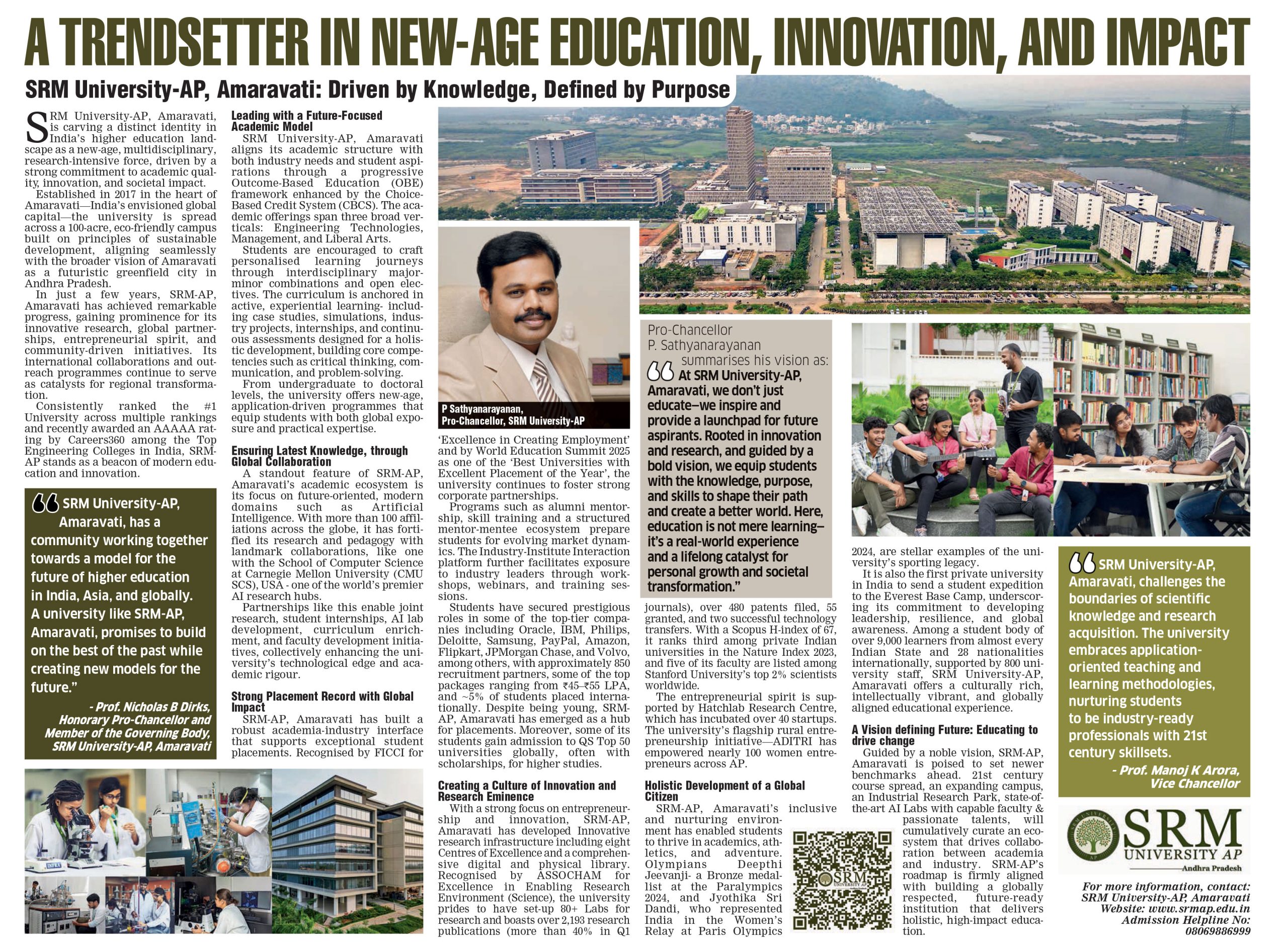
- SRM-AP Partners with Elevium to Offer Industry-Aligned Courses May 28, 2025
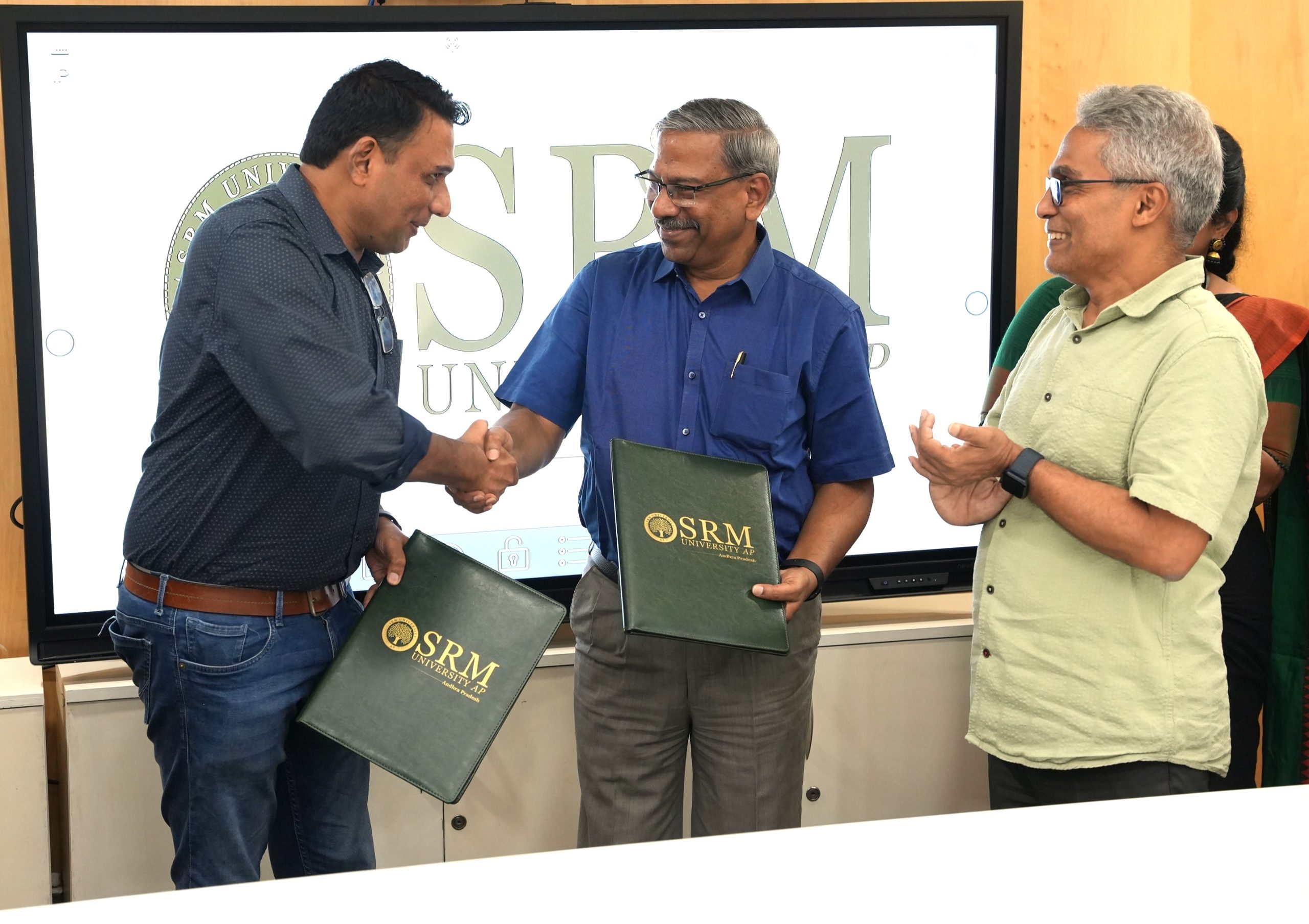 In a significant move to enhance skill-based learning through academia–industry collaboration, SRM University-AP, Amaravati, has entered into a strategic Memorandum of Agreement (MoA) with Elevium a division of Nanochip Skills Pvt. Ltd, a leading Bengaluru-based industry partner, to deliver cutting-edge, industry-aligned courses to students of the Department of Electronics and Communication Engineering (ECE).
In a significant move to enhance skill-based learning through academia–industry collaboration, SRM University-AP, Amaravati, has entered into a strategic Memorandum of Agreement (MoA) with Elevium a division of Nanochip Skills Pvt. Ltd, a leading Bengaluru-based industry partner, to deliver cutting-edge, industry-aligned courses to students of the Department of Electronics and Communication Engineering (ECE).This partnership bridges the gap between theoretical education and real-world industry requirements, particularly for ECE students. As part of the MoA, undergraduate ECE students from the 3rd to 7th semesters will have the opportunity to enroll in specialised, industry-aligned courses in VLSI, Embedded Systems, and Edge AI key domains shaping the future of the electronics sector.
Key Highlights of the Agreement:
Structured Course Delivery: One industry-aligned course per semester, each comprising 60 hours – delivered through a hybrid model of 40% offline and 60% online learning.
Enrollment Strategy: Designed for a minimum batch size of 120 students, with optional enrollment extended to students from other departments based on institutional discretion.Elevium will provide expert faculty from the industry, handle curriculum delivery, conduct assessments, and participate in curriculum review through Board of Studies meetings. SRM University-AP will facilitate access to classrooms, labs, and administrative support to integrate these courses seamlessly into the academic structure.
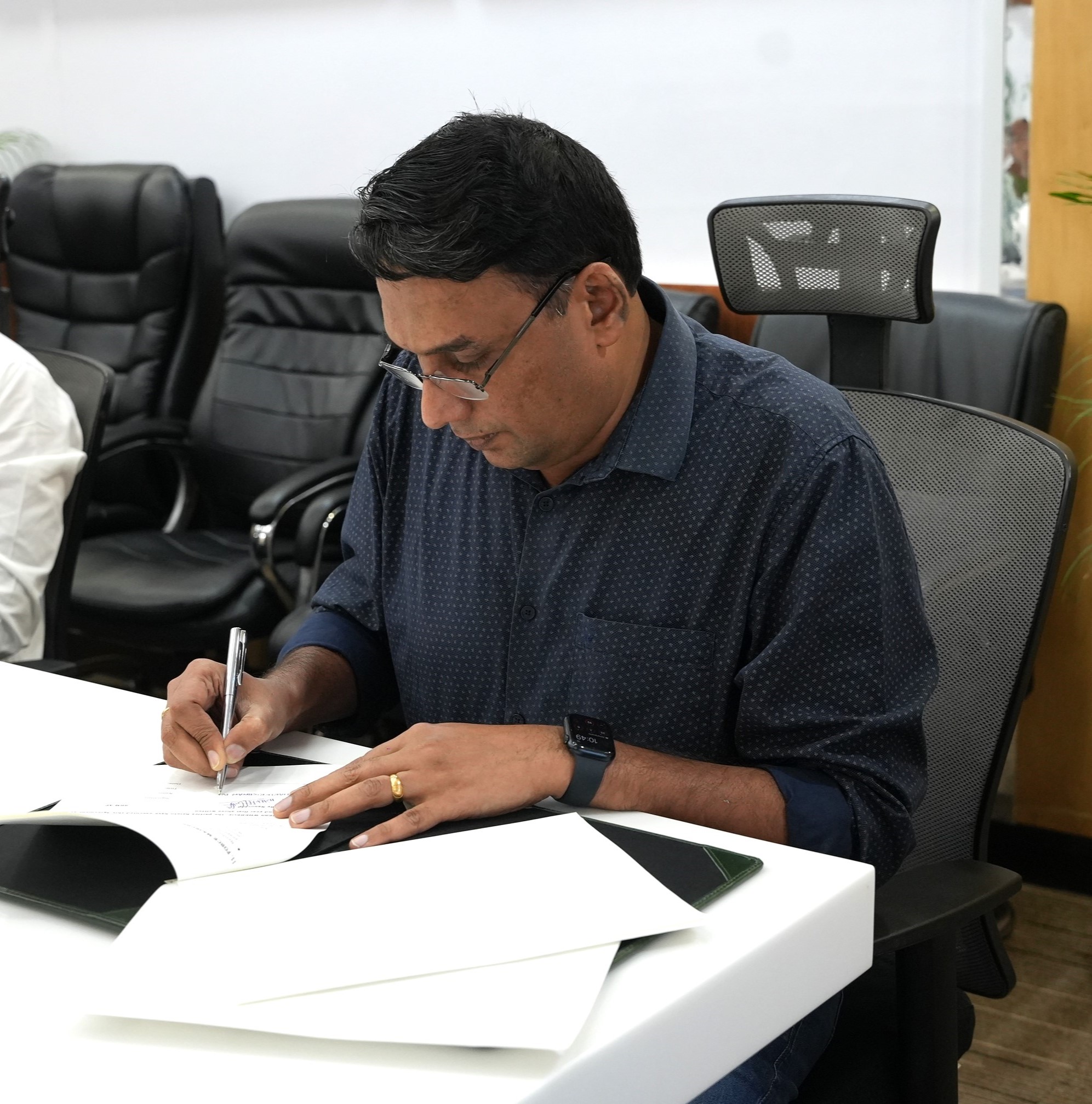
Student Evaluation and Curriculum Design:
Assessment methods and syllabus structures will be collaboratively developed and aligned with SRM-AP’s academic standards. The courses will include continuous evaluations and feedback mechanisms, with grading support from Elevium.
Placement and Career Support:
As part of its commitment, Elevium will extend comprehensive placement support including career counseling, guest lectures by industry experts, internship facilitation, and project guidance to enhance students’ employability.The primary goal of the MoA is to empower undergraduate students with hands-on learning aligned with current industrial practices and to facilitate their transition from classroom to the corporate world through structured and practice-driven academic modules.
The agreement was formally signed in the presence of esteemed dignitaries from both organisations, including Hari Krishnan Puravankara, CEO of Nanochip Group of Companies, Dr Manoranjan Kumar, Manager of university Programs at Nanochip Group of Companies, Dr Prem Kumar, Registrar, Prof. C V Tommy, Dean of SEAS, and other faculty members from the ECE department.
This collaboration exemplifies SRM-AP’s commitment to transforming education by integrating academic knowledge with industrial applications. Thus, students are empowered with real-world competencies that are crucial for tomorrow’s technology leaders.
Continue reading → - The ‘Unholy’ Trinity: Repression of the Working- Class in Late-Colonial Bengal May 21, 2025
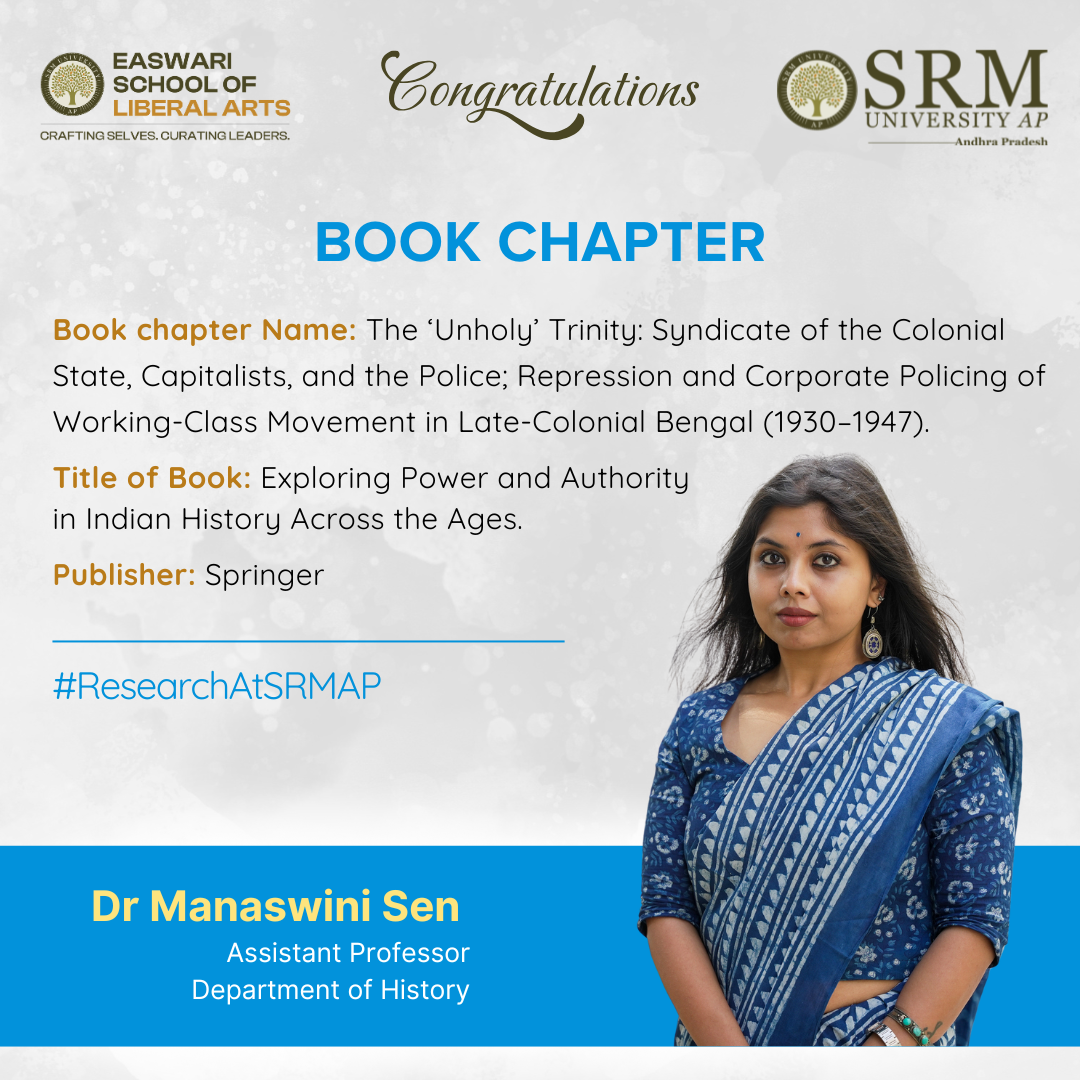 Dr Manaswini Sen, Assistant Professor in the Department of History at SRM University – AP, Amaravati in her chapter titled “The ‘Unholy’ Trinity: Syndicate of the Colonial State, Capitalists, and the Police; Repression and Corporate Policing of Working-Class Movement in Late-Colonial Bengal (1930–1947)”, published in Exploring Power and Authority in Indian History Across the Ages (Springer), investigates how the colonial state, capitalist interests, and the police referred to as the “unholy trinity”collaborated to repress working-class movements in late-colonial Calcutta between 1930 and 1947.
Dr Manaswini Sen, Assistant Professor in the Department of History at SRM University – AP, Amaravati in her chapter titled “The ‘Unholy’ Trinity: Syndicate of the Colonial State, Capitalists, and the Police; Repression and Corporate Policing of Working-Class Movement in Late-Colonial Bengal (1930–1947)”, published in Exploring Power and Authority in Indian History Across the Ages (Springer), investigates how the colonial state, capitalist interests, and the police referred to as the “unholy trinity”collaborated to repress working-class movements in late-colonial Calcutta between 1930 and 1947.The study examines the complex interests of the capitalist class and the British imperial state in late colonial India, focusing on their collective oppression towards labor radicalisation. It examines the legal measures taken by the British imperial state to monitor working-class militarisation and the strategies employed by capitalists to disrupt strikes and deny workers’ claims.
The chapter also discusses the establishment of white or pro-state unions that used communalism to disrupt strikes and hinder revolutionary union movements in late colonial Calcutta. The chapter provides new perspectives on competition-collaboration theories, discusses the role of Indian capitalists, and explores the question of communalism in trade union politics in late colonial Bengal. It is relevant for those working in labour history, mass movement history, late colonial Calcutta, and urban history.
About the book :
Exploring Power and Authority in Indian History Across the Ages offers a nuanced exploration of power and authority in Indian history through a series of case studies spanning different regions and time periods. It examines the sociological, cultural, economic, and historical dimensions of power, critiques dominant ideologies, and highlights responses from marginalised groups. Providing insights into diverse political structures from ancient to modern times, this volume is a valuable resource for historians, scholars, and researchers of Indian and South Asian history.
Continue reading →


